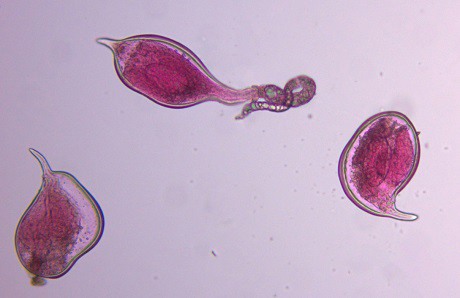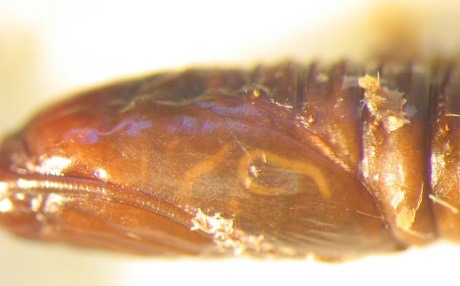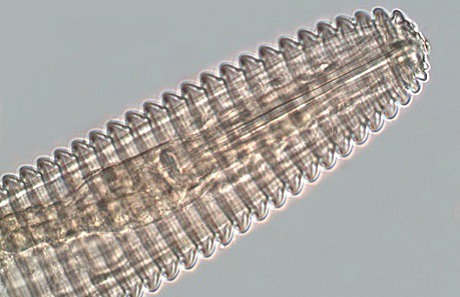Throughout South Africa fruit and vegetable crops are experiencing the effects of drought and a concomitant vulnerability to stress factors. In the absence of more water or fertilisers, farmers are increasingly looking at harnessing the positive power of beneficial nematodes, which have for a long time only had a bad reputation.
 Tylenchulus semipenetrans, a parasitic nematode on citrus, grape vines and persimmons (photo: Karina Roodt, Nemlab)
Tylenchulus semipenetrans, a parasitic nematode on citrus, grape vines and persimmons (photo: Karina Roodt, Nemlab)
The adverse effects of certain species of nematodes are well-known to farmers, but award-winning laboratory Nemlab is promoting the use of African entomopathogenic nematodes (EPNs), which are biocontrol agents that can be used against, among others, the larvae of the dreaded false codling moth.
They point out that EPNs are invaluable in an integrated pest management programme, but fumigation with nematicides and ploughing deplete the soil of beneficial nematodes. These beneficial nematodes have been likened to the use of probiotics during a course of antibiotics.
EPNs seek and destroy FCM larvae
“What’s great about EPNs is that they actively seek and target pests. They are attracted to the carbon dioxide released by insects,” says Sheila Storey, founder of Nemlab 33 years ago. The nematodes infiltrate the insect and releases a lethal bacterium which liquefies the insect’s innards. “The whole process happens within 48 hours and can deliver 80% mortality. No chemical does that.”
She warns against the use of imported EPNs, often from Europe, as these can disrupt soil communities.
 Entomopathogenic nematodes inside an insect they attacked (photo: Prof Antoinette Malan, Stellenbosch University)
Entomopathogenic nematodes inside an insect they attacked (photo: Prof Antoinette Malan, Stellenbosch University)
Nemlab has set up an enterprise called NemaBio to commercially produce entomopathogenic nematodes (EPNs), using specifically indigenous nematode species, with a focus on false codling moth and snout beetles. It has taken them years to perfect the right formulation for the product, which is a living organism with a limited shelf life, but they believe they’ve finally hit upon the winning formula.
It will be registered for false codling moth on citrus and snout beetle on grapevines, but it is also effective against fruit flies. The company is doing its first year of trials, while putting together financing for the required bioreactor and the product could go on sale by 2021.
A spray of EPNs is not only effective in the orchard, but also possibly on wooden bins where codling moth larvae can complete their life cycle and infest new areas.
 Criconemoides xenoplax or ring nematode, a common parasitic nematode on grapes and stone fruit (photo: Prof Antoinette Malan, Stellenbosch University)
Criconemoides xenoplax or ring nematode, a common parasitic nematode on grapes and stone fruit (photo: Prof Antoinette Malan, Stellenbosch University)
Increased awareness that soil is a living organism
Nemlab has long served the grape, top fruit, stone fruit and citrus industries in the Western Cape, but have noticed more enquiries from kiwi and potato producers in KwaZulu-Natal than before. Not only fruit and vegetable, but also wheat and canola producers are running into trouble with nematodes. Sheila Storey consults widely throughout Africa, including Zambia, Namibia, Zimbabwe and Egypt.
Nemlab’s tests determine whether crops have been colonised by mycorrhizae, as well as a soil health test where they use nematodes as bio-indicators of soil health. They also test for nematodes on seeds and nursery propagation material.
“It is getting more popular to combine the routine nematode analysis with the soil health test,” says Lené van der Walt, nematologist at the facility. “The reason for this would be the increasing awareness of the fact that soil is a living organism. More producers are exploring regenerative agricultural practices and want to know if the actions they are putting in place to increase soil health are actually taking them in the right direction. They will thus take a baseline sample (before new practices are being implemented) and then send follow-up samples on an annual or bi-annual basis to see what happened.”
Successful regeneration of soil health in apple orchards
In the Koue Bokkeveld, a dominant apple, cherry and onion production area, a number of producers have been putting soil regenerative practices in place a few years ago and according to Nemlab’s soil test results, they are beginning to reap the rewards with some of the healthiest soil samples the facility has received.
The healthy soil of a Koue Bokkeveld apple orchard
“One thing that some producers don’t like is the fact that the benefits of regenerative agricultural practices mostly become visible only after a few years. There was a trial in apple orchards where we could only see a significant increase after 5 years, but it’s a mind-shift and not a quick fix.”
The facility is based in Klapmuts, Western Cape, with a satellite lab at NviroTek Labs in Hartbeespoort, Northwest Province (operating under licence from Nemlab with regards to nematode testing).
Most of Nemlab’s testing work comes from inside South Africa, as import permits for soil samples are cumbersome, but they are getting a lot of requests for analyses from neighbouring countries where there are very few nematode testing facilities.
Sheila recently received both the South African Innovation Summit as well as the Hortgro Innovation awards and earlier this year she was given the Bayer award at the Nematological Society of Southern Africa’s bi-annual meeting for her role in the advancement of nematology in Southern Africa.
For more information:
 Nemlab
Nemlab
Tel: +27 21 875 8160
Email: info@nemlab.co.za
https://www.nemlab.co.za/
